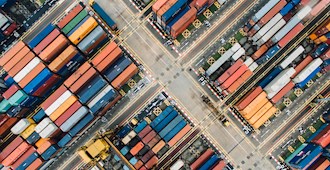Unleashing the Importance of Logistics in Facilitating Trade
Date: 29/12/2023
In an increasingly interconnected world, trade has emerged as the driving force behind economic growth. It facilitates the exchange of goods and services across borders, not only fueling economic expansion, but also fostering cultural interchange.
In an increasingly interconnected world, trade has emerged as the driving force behind economic growth. It facilitates the exchange of goods and services across borders, not only fueling economic expansion, but also fostering cultural interchange. However, the success of any trade transaction is underpinned by a complex network of logistical operations that ensures the efficient movement of goods across borders, enabling businesses to explore new markets and capitalise on emerging opportunities. And logistics, which involves the planning, implementation, and control of the effective flow and storage of goods, plays a crucial role in facilitating that transaction.
In this blog, we will explore the significance of logistics and how it enables the seamless exchange of goods on a global scale. We will discuss the pivotal role of logistics in supporting economic growth, fostering international trade, and how its effective management and optimization contributes to the success of businesses, industries, and economies worldwide. By understanding the importance of logistics, we can uncover strategies and best practices to overcome challenges and leverage opportunities in the ever-changing world of trade.
Defining Logistics
Logistics, in its broadest sense, refers to the management of the flow of goods and services from the point of origin to the point of consumption. It involves various interconnected processes, including transportation, warehousing, inventory management, packaging, and information management. The goal of logistics is to optimise these processes to ensure the timely and efficient delivery of goods while minimising costs and maximising customer satisfaction.
How Does Logistics Impact Trade Efficiency?
Efficiency is paramount in facilitating trade, and logistics play a vital role in achieving it. Let's delve into the specific ways in which logistics impacts trade efficiency.
Supply Chain Optimization
Logistics focuses on streamlining the supply chain process, which encompasses all the activities involved in the production, transformation, and distribution of goods. By coordinating these activities effectively, logistics reduce lead times, minimise disruptions, and enhance overall supply chain performance. This optimization allows businesses to respond quickly to market demands, adapt to changing customer preferences, and stay competitive in the global trade arena. In this regard, the World Logistics Passport (WLP) plays a vital role by collaborating with a number of partners to ensure smooth supply chain processes for its members. Through these partnerships, WLP enhances connectivity, fosters collaboration, and promotes best practices, enabling traders and freight forwarders to leverage comprehensive solutions and drive seamless trade operations.
Timely Delivery and Reduced Costs
Efficient logistics ensures the timely delivery of goods, which is crucial for trade. It encompasses the selection of the most appropriate transportation modes, route planning, and efficient scheduling. By optimising these aspects, WLP minimises transportation costs, reduces inventory holding costs, and enhances overall cost-effectiveness. This not only benefits businesses but also contributes to lower prices for consumers, driving demand, boosting economic growth, aiding members in gaining trade benefits from all logistics operations.
Increased Trade Volumes
Well-planned logistics processes enable businesses to engage in larger-scale trade operations. By reducing costs, improving delivery times, and enhancing reliability, logistics encourages businesses to expand their market reach and engage in more extensive trading activities. This leads to increased trade volumes, which directly contribute to economic growth.
Inventory Management
Logistics plays a crucial role in managing inventory effectively throughout the supply chain. By implementing efficient warehousing and inventory control practices, logistics helps businesses maintain optimal stock levels, reducing the risk of stockouts or excess inventory. This, in turn, minimises carrying costs, improves cash flow, and enhances the overall trade efficiency.
Trade Facilitation
Crossing international borders involves navigating a complex web of customs procedures, documentation requirements, and regulatory compliance. Logistics plays a critical role in trade facilitation by ensuring smooth customs clearance, efficient documentation processes, and compliance with safety and quality standards. By managing these complexities, it’s possible to reduce bureaucratic bottlenecks, minimise delays, and enable faster clearance of goods at borders. This promotes trade efficiency and fosters stronger international trade relationships.
Regional Integration and Trade Agreements
Efficient logistics has an essential impact on regional integration and trade agreements. By facilitating the movement of goods across borders, logistics help promote closer economic cooperation between countries. Regional trade agreements, such as free trade agreements and customs unions, aim to eliminate barriers to trade and create a more integrated economic region. Efficient logistics systems ensure the seamless implementation of these agreements, enabling the smooth flow of goods, reducing trade costs, and stimulating trade growth within the region.
Foreign Direct Investment (FDI) Attraction
Countries with well-developed logistics infrastructure and efficient trade processes often attract higher levels of foreign direct investment (FDI). Investors seek locations where they can establish their operations with ease, ensuring a smooth flow of goods and access to global markets. A strong logistics framework creates a favourable business environment, reducing operational risks and increasing investor confidence. Consequently, countries with efficient logistics systems can benefit from increased FDI inflows, leading to job creation and technological advancements.
Connecting Global Markets
Logistics serves as the bridge that connects different markets and economies worldwide. It facilitates the movement of goods across borders, regardless of the physical distance separating trading partners. Through an intricate web of transportation modes, including ships, planes, trains, and trucks, logistics ensures that products can reach any corner of the world, unlocking vast opportunities for businesses to expand their reach and access new markets. Moreover, logistics plays a vital role in facilitating the import and export of goods, enabling countries to specialise in their competitive advantages and benefit from international trade.
Infrastructure Development
Efficient logistics operations heavily rely on well-developed transportation infrastructure, including ports, roads, railways, and airports. However, many regions around the world suffer from inadequate infrastructure, which hampers trade and increases costs. Governments and businesses must invest in infrastructure development to improve connectivity, reduce transportation bottlenecks, and enhance the overall efficiency of logistics networks.
The importance of logistics in facilitating trade cannot be overstated. Logistics acts as a critical enabler, ensuring the smooth and efficient movement of goods across borders, supporting economic growth, and fostering cultural interchange. And with our expertise at the World Logistics Passport, we can help traders and freight forwarders by providing comprehensive solutions that enhance their logistical capabilities and drive seamless trade operations. Contact us to learn more about us and our locations.




